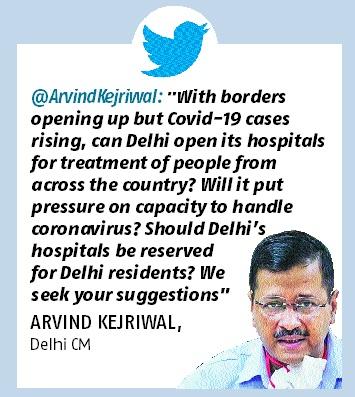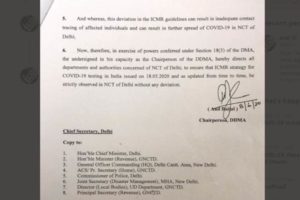This article has been written by Mustafa Chitalwala., a student of Symbiosis Law School, Pune.
The Covid-19 pandemic has put immense pressure on our public sectors and their resources. However, is it justified that one State or Union territory withstand the infected people of another State to get admitted into their Hospitals? Well, the Delhi Chief Minister Arvind Kejriwal has taken a bold decision to close its borders and a Proposal presiding “Delhi Hospitals for Delhi Localite’s.” Which has caused a moral dilemma between the people of India. Some people say that the move by Delhi’s CM is fair as Delhi hospitals are overburdened and the State has the power to take this decision. Others, however, raised a question over the denial of the principle of natural justice and the violation of the Constitution of India. Just as there are two sides to a coin, there are two sides to every story.
THE PROTECTIONIST POLICY
Delhi has the second-most cases in India right behind Maharashtra. Delhi is having one of the best healthcare facilities in India, if it does not seal its borders, people from across the country will pour in there prior and occupy their available beds. At a time like this, Delhi’s Medical Infrastructure may crumble. The CM said that even private hospitals would have to reserve beds for Delhi residents and added hospitals functioning in Delhi under the central government would be open to patients from outside the National Capital.
The CM’s orders came after Uttar Pradesh, and Haryana sealed its borders with Delhi. The Uttar Pradesh Government went one step further and blamed Delhi for 40% of Noida’s Covid-19 cases. The state governments were allowed to decide on interstate movement under Centre’s guidelines for Unlock 1.0 in effect from 1st June.
When the lockdown was imposed, every State was given an opportunity to ramp up their existing Public Health Infrastructure; however, this infrastructure has been built keeping in mind the following points 1.Population of Delhi, 2. The infection rate in Delhi, and 3. Will Delhi be equipped to deal with the situation if it goes from bad to worse (like right now). Given an example by an AAP spokesperson that if there is a fire in Uttar Pradesh and Delhi at the same time, the Delhi government will first cater to its people of that State and then go to Uttar Pradesh.
There is no embargo on the Delhi Government to take such a decision because this decision is taken in the interests of the people when there is a pandemic in compliance with the provisions of the Disaster Management Act, 2005 & Epidemic Diseases Act, 1897, where the different powers of the agencies and the powers of the Government are to be suspended.
CONSTITUTIONAL LEGALITY
Some people find this proposal is unethical and selfish, stating that it is unconstitutional and is against the spirts of the constitution to be biased. The Centre annually imposes Rs. 3500 Crore into the public medical sector of the Capital. What if the same proposal was given by the Central government stating that all the central government’s hospitals will be off-limits for Delhi’s residents?
A doctor’s priority is to look after a patient; it’s no one’s duty to ask the patients which State they reside from or differentiate between the rich or the unfortunate which is an open attack on the constitutional value of fraternity and the concept of unity and nationhood in India. If one is fighting a war, it should be done collectively. Note that the city’s infrastructure greatly benefits from tax revenue collected from the various States.
It is also a denial of our basic fundamental rights to healthcare and therefore violating Article 14, 15, and 21 of the Constitution.
It violates Article 14 since it denies access to the importance of health and qualified doctors to care of the patients who are in desperate need. Article 21 is the protection of life and personal liberty. No person shall be deprived of his life or personal liberty except according to the procedure established by law.
In the State of Punjab v. Mohinder Singh Chawla (1997) 2 SCC 83, the Court observed that the “right to health is an integral part of the right to life. The government has a constitutional obligation to provide health facilities.”
In Ashwani Kumar v. UOI (2019) 2 SCC 636, the Court emphasized that “the State is obligated to ensure that these fundamental rights are not only protected but are enforced and made available to all citizens.” (emphasis supplied).
In Navtej Singh Johar vs. Union of India, the Court observed: “The jurisprudence of this Court, in recognizing the right to health and access to medical care, demonstrates the crucial distinction between negative and positive obligations.
The Delhi’s LG Anil Baijal overruled CM Arvind Kejriwal’s decision and stated that the treatment “should not be denied to any patient on the grounds of being a non-resident of Delhi”. In addition, he has also directed authorities to ensure the same and went on to refer to the Constitution of India saying, “Right to Health is an integral part of Right to Life”.




